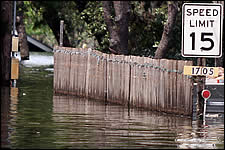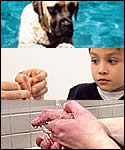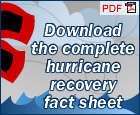HURRICANE AND FLOOD RECOVERY:
Prevent and Treat Other Illnesses and Injuries After a Hurricane or Flood
HIGHLIGHTS
- Prevent Carbon Monoxide poisoning: Don't use a generator, pressure washer, charcoal grill, camp stove, or other gasoline- or charcoal-burning device inside your home or near a window, door, or vent.
- To prevent mold growth, clean wet items and surfaces with detergent and water.
- Avoid lifting any material that weighs more than 50 pounds (per person).
Prevent carbon monoxide poisoning
Carbon monoxide is an odorless, colorless gas that is produced by many types of equipment and is poisonous to breathe. Don't use a generator, pressure washer, charcoal grill, camp stove, or other gasoline- or charcoal-burning device inside your home, basement, or garage or near a window, door, or vent. Don't run a car or truck inside a garage attached to your house, even if you leave the door open. Don't heat your house with a gas oven. If your carbon monoxide detector sounds, leave your home immediately and call 911. Seek prompt medical attention if you suspect carbon monoxide poisoning and are feeling dizzy, light-headed, or nauseated.
For more information, see Carbon Monoxide Poisoning After a Disaster.
Avoid floodwater and mosquitoes
 Follow all warnings about water on roadways. Do not drive vehicles or heavy equipment through water. If you have to work in or near floodwater, wear a life jacket. If you are caught in an area where floodwater is rising, wear a life jacket, or use some other type of flotation device. Prevent mosquito bites by wearing long pants, socks, and long-sleeved shirts and by using insect repellents that contain DEET or Picaridin.
Follow all warnings about water on roadways. Do not drive vehicles or heavy equipment through water. If you have to work in or near floodwater, wear a life jacket. If you are caught in an area where floodwater is rising, wear a life jacket, or use some other type of flotation device. Prevent mosquito bites by wearing long pants, socks, and long-sleeved shirts and by using insect repellents that contain DEET or Picaridin.
More information about these and other recommended repellents can be found in the fact sheet Updated Information Regarding Insect Repellents.
Avoid unstable buildings and structures
Stay away from damaged buildings or structures until they have been examined and certified as safe by a building inspector or other government authority. Leave immediately if you hear shifting or unusual noises that signal that the structure is about to fall.
Beware of wild or stray animals
Avoid wild or stray animals. Take appropriate precautions to avoid animal bites and rabies exposure (see Rabies Exposure: What You Need to Know). Call local authorities to handle animals. Get rid of dead animals according to local guidelines.
Beware of electrical and fire hazards
NEVER touch a fallen power line. Call the power company to report fallen power lines. Avoid contact with overhead power lines during cleanup and other activities. If electrical circuits and equipment have gotten wet or are in or near water, turn off the power at the main breaker or fuse on the service panel. Do not turn the power back on until electrical equipment has been inspected by a qualified electrician. Do not burn candles near flammable items or leave the candle unattended. If possible, use flashlights or other battery-operated lights instead of candles.
Beware of hazardous materials
Wear protective clothing and gear (for example, a respirator if needed) when handling hazardous materials. Wash skin that may have come in contact with hazardous chemicals. Contact local authorities if you are not sure about how to handle or get rid of hazardous materials.
Clean up and prevent mold growth
Clean up and dry out the building quickly (within 24 to 48 hours). Open doors and windows. Use fans to dry out the building. To prevent mold growth, clean wet items and surfaces with detergent and water. To remove mold growth, wear rubber gloves, open windows and doors, and clean with a bleach solution of 1 cup of bleach in 1 gallon of water. Throw away porous items (for example, carpet and upholstered furniture) that cannot be dried quickly. Fix any leaks in roofs, walls, or plumbing.
For more information, see Mold After a Disaster.
Pace yourself and get support
Be alert to physical and emotional exhaustion or strain. Set priorities for cleanup tasks, and pace the work. Try not to work alone. Don't get exhausted. Ask your family members, friends, or professionals for support. If needed, seek professional help.
Prevent musculoskeletal injuries
Use teams of two or more people to move bulky objects. Avoid lifting any material that weighs more than 50 pounds (per person).
 Stay cool
Stay cool
When it's hot, stay in air-conditioned buildings; take breaks in shaded areas or in cool rooms; drink water and nonalcoholic fluids often; wear lightweight, light-colored, loose-fitting clothing; and do outdoor activities during cooler hours.
Treat wounds
Clean out all open wounds and cuts with soap and clean water. Apply an antibiotic ointment. Contact a doctor to find out whether more treatment is needed (such as a tetanus shot). If a wound gets red, swells, or drains, seek immediate medical attention.
Wash your hands
Use soap and warm water to wash your hands. If water isn't available, you can use alcohol-based products made for washing hands.
Wear protective gear for cleanup work
Wear hard hats, goggles, heavy work gloves, and watertight boots with steel toes and insoles (not just steel shank). Wear earplugs or protective headphones to reduce risk from equipment noise.
For more information, see Prevent Illness after a Natural Disaster and Prevent Injury after a Natural Disaster.
- Page last updated: September 2, 2008
- Content source: National Center for Environmental Health (NCEH), Coordinating Center for Environmental Health and Injury Prevention (CCEHIP)
Get email updates
To receive email updates about this page, enter your email address:
Contact Us:
- Centers for Disease Control and Prevention
1600 Clifton Rd
Atlanta, GA 30333 - 800-CDC-INFO
(800-232-4636)
TTY: (888) 232-6348
24 Hours/Every Day - cdcinfo@cdc.gov


